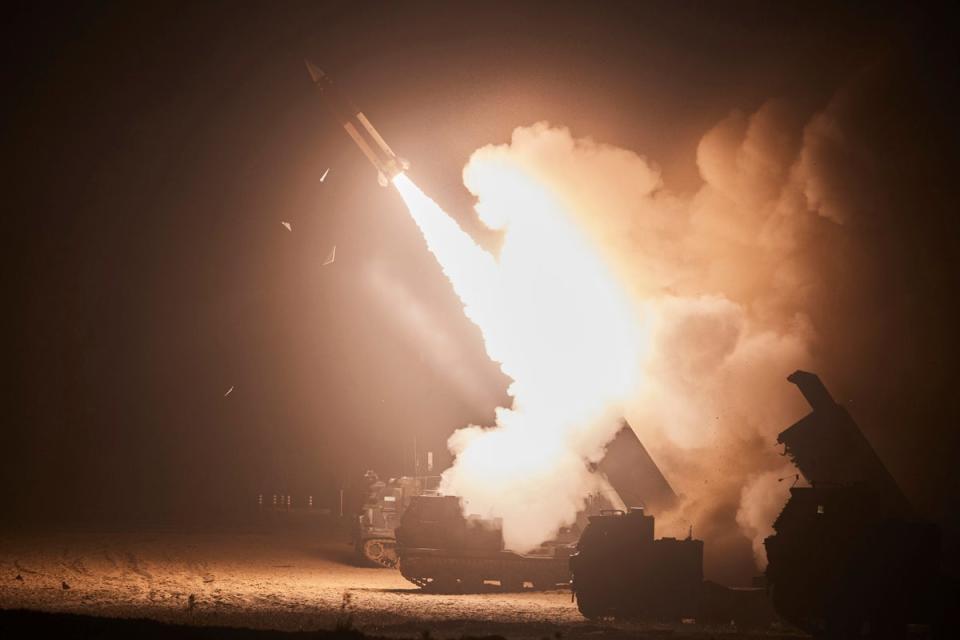US and South Korea fire eight missiles in response to North Korean launches
The US and South Korea launched eight ballistic missiles into the sea in a show of force to match what appeared to be North Korea’s record missile tests on a single day.
The allies conducted the joint missile launches on Monday to demonstrate “capability and posture to launch immediate precision strikes” in response to North Korea’s “provocations”.
Eight surface-to-surface Army Tactical Missile Systems (ATACMS) – one American and seven South Korean missiles – were fired in 10 minutes, according to South Korea’s Joint Chiefs of Staff and US Forces Korea.
The eight missiles were fired into South Korea’s eastern waters at 4.45am local time on Monday, it added.
The tit-for-tat move came hours after Washington and Seoul claimed Pyongyang fired a salvo of eight short-range missiles towards the sea on Sunday, possibly setting a single-day record for ballistic missile launches.
A volley of missiles was fired from at least four different locations in succession over 35 minutes, in what analysts said was practice for overwhelming South Korea’s missile defences.
North Korea’s record-setting missile testing spree came just days after the country took the leadership of the world’s foremost multilateral disarmament group at the UN amid strong opposition from the member countries.

The country took the temporary presidency of the Conference on Disarmament – the world’s only permanent multilateral body to negotiate arms control and end the nuclear arms race – amid criticism that its leadership would undermine the credibility of the grouping.
South Korean president Yoon Suk Yeol, who took office last month vowing to take a tougher line against the North’s provocative launches, said on Monday that his government would “sternly respond to any kind of North Korean provocation”.
“North Korea’s nuclear weapons and missile programs have grown to a point where they are not only a threat to the Korean Peninsula, but to northeast Asia and world peace,” said Mr Yoon during speech marking the country’s Memorial Day.
The Indo-Pacific Command confirmed the test and said the US commitment to defend South Korea remained ironclad.
“The ROK-US Alliance remains committed to peace and prosperity on the Korean Peninsula and throughout the Indo-Pacific,” it said in a statement, using the initials of South Korea’s official name.
It added the missiles were fired from the northeast of South Korea into the Sea of Japan following notifications for air and maritime safety.
North Korean state media did not confirm Sunday’s launches, a norm in line with other tests conducted since April. The launches came a day after US aircraft carrier USS Ronald Reagan concluded a three-day naval drill with South Korea in the Philippine Sea on Saturday, their first joint drill involving a carrier since 2017.
The US also conducted a joint ballistic missile exercise with Japan, hours after North Korea’s Sunday tests, to show their “rapid response capability” and “strong determination” to counter threats, the latter country’s defense ministry said.
Leif-Eric Easley, a professor at Ewha University in Seoul, said South Korea and US’s current missile defenses are no match for North Korea’s expanding threat as Kim Jong-un continues to prioritise military modernisation.
“The allies have quickly responded to the Kim regime’s recent missile firings with counter launches that demonstrate combined readiness for precision strikes against the origin of an attack. But current missile defenses are insufficient against the expanding North Korean threat,” he said
“This calls not only for further investments in hardware but also a more multilayered approach coordinated with Japan and diplomatic efforts with Beijing to reduce arms race dynamics with Pyongyang.”
This was North Korea’s 18th round of missile tests in 2022 alone, including the country’s first launches of intercontinental ballistic missiles in nearly five years.
Tension mounts in the Korean peninsula as Japan, US and South Korea scramble to prepare for action against a potential seventh nuclear test by the North in near future.
South Korean and US officials have intercepted intelligence that the North is preparing to conduct its nuclear test since September 2017 as Mr Kim pushes to cement the country’s status as nuclear power and negotiate economic and security concessions from a position of strength.
The US has promised additional international sanctions if North Korea conducts UN-sanctioned nuclear tests, but the efforts are expected to be of no consequence as Russia and China are expected to counter any possible resolution at the UN Security Council.
Moscow and Beijing, both North Korean allies, earlier vetoed a US-sponsored resolution that would have imposed additional sanctions on the country over its latest ballistic tests on 25 May and urged Washington to focus on negotiations with Pyongyang.
Mr Kim, however, continues to pursue his pressure campaign as the country grapples with mounting Covid cases within the largely unvaccinated autocracy that is known to have poor public healthcare facilities.

